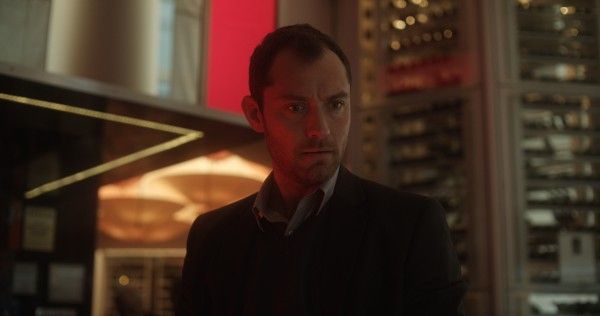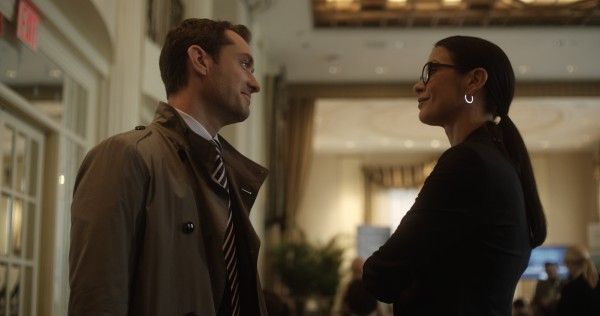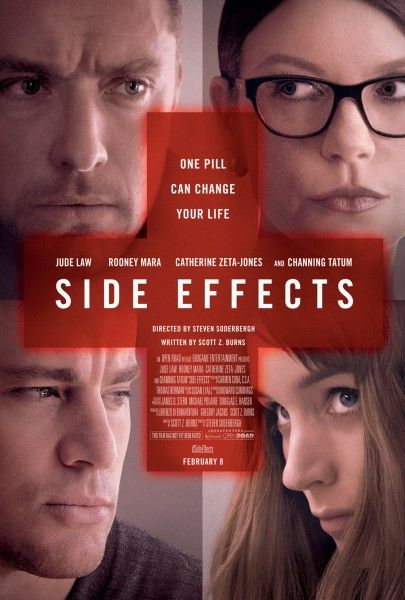For better or for ill, we're living through chemistry. It is not a new phenomenon, but it is one that has drastically accelerated, and one with dangerous consequences we can't escape. Arguably the most dangerous is the field of anti-depressants/anti-anxiety drugs. These drugs have value, but their effectiveness, and more importantly, their prescription, is always uncertain. We're flawed individuals who are asking for psychological help from other flawed people. Steven Soderbergh's Side Effects spends its first-half exploring this fascinating and complicated issue, but in its second-half, the film ceases to explore the mind, and becomes a mind-numbingly idiotic thriller.
Emily Taylor (Rooney Mara) is suffering from depression even though her husband Martin (Channing Tatum) has just been released from prison after a four-year stint for insider trading. After Emily apparently tries to commit suicide, she begins seeing Dr. Jonathan Banks (Jude Law), who prescribes a variety of medications even though he has an uncomfortably cozy but professionally common relationship with a pharmaceutical company. When he prescribes the drug Ablixa at the recommendation of Emily's former psychiatrist Dr. Victoria Siebert (Catherine Zeta-Jones), the ramifications turn dire, and Jonathan's life begins to fall apart as a result.
The first-half of Side Effects is filled with sharp insights into our relationship with modern medicine. When Jonathan prescribes an SSRI, he explains to Emily, "It stops the brain from telling you you're sad," even though sadness is a healthy emotion and shouldn't be shut down completely. Later, Jonathan spouts off lines like "Medication makes it easier to be who you are," and "Depression is the inability to construct a future." Law's performance leaves no doubt that Jonathan truly believes he's helping his patients, but his platitudes belie a rehearsed, detached attitude. While the film is never a screed on the psychiatric industry, it's hard to miss the inclusion of ads for medication, or how various pharmaceutical companies push a product over an individual patient's mental health.
The movie is at its most rewarding when it explores how drugs affect our personalities. When Jonathan says, "Medication makes it easier to be who you are," it immediately raises the question, "Who are we?" Someone who's depressed due to biological and genetic circumstance is truly a depressed person. There's no escape and no way to will oneself to happiness. Jonathan misunderstands depression as the inability to construct a future when it's actually the inability to imagine happiness in that future or at any point*. If Emily is truly depressed, then medication is to bring her to a state of normalcy, but is that her true self? What does medication do to us?
And while Side Effects isn't a direct attack on psychiatrists (and it has nothing but sympathy for Jonathan in the second-half), it does correctly note how the decision to prescribe medication is a crapshoot. Jonathan doesn't get the right medication for Emily on the first try, and later he starts wondering if they need to start supplementing her medication with other medication. Jonathan isn't a bad person, but he's flying as blind as any other psychiatrist. That's the trick of "better living through chemistry." We technically have the tools for better living, but those tools are clumsily applied when it comes to psychology. When you hurt your leg, your doctor doesn't screw around trying to figure out the best brand of brace. The same can't be said of psychiatric drugs.
The questions revolving around the film's first-half turn Side Effects into more of a think-piece rather than a thriller even though the movie begins with the disturbing image of a bloodstained floor before cutting back to three months earlier. For those willing to engage with the issues in the film's first-half, Side Effects is a little dry but never dull. Soderbergh keeps us in the mood with a bleary-eyed approach that keeps us in Emily's numb, detached state.
But about halfway through, the film flips into a thriller and everything falls apart. Not only does Side Effects become completely reliant on increasingly moronic twists, but everything thoughtful in the first-half is undermined by revelations in the second-half. Jonathan starts out as a relatable and flawed psychiatrist, but the story requires him to become an excellent detective and expert manipulator. He's no longer the everyshrink, but someone who should have become a P.I. instead of M.D. I won't reveal any details about the increasingly contrived plot other than to say that it gives the film a bitter aftertaste that's unworthy of Soderbergh's usually sharp filmmaking.
The script feels like writer Scott Z. Burns ran out of story at the film's turning point, and rather than dig deeper into the thoughtful issues that were raised in the first-half, he threw them out the window to stumble through a paranoid thriller that comes out of nowhere. The movie can drop a reference to William Styron's seminal memoir on depression, Darkness Visible, or show us how Jonathan is "descending into madness", but these moves are unworthy of the intelligent observations from earlier in the story. Side Effects never quite grasps the nature of depression, but it does a good job of creating the frustration of withdrawal.
Rating: C-
*Jodie Foster's The Beaver isn't a good film, but it perfectly depicts depression with regards to Mel Gibson's performance at the beginning of the movie.





